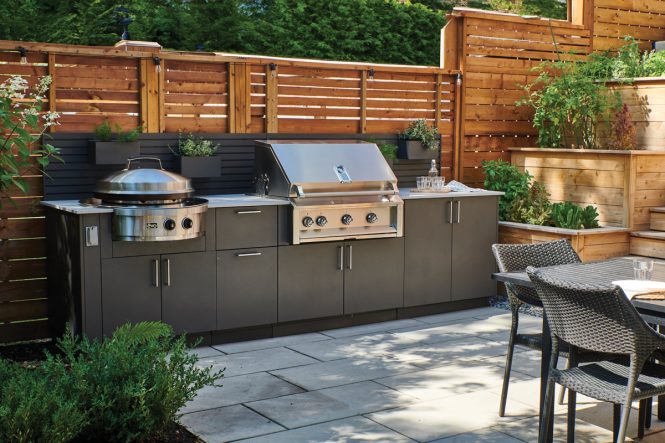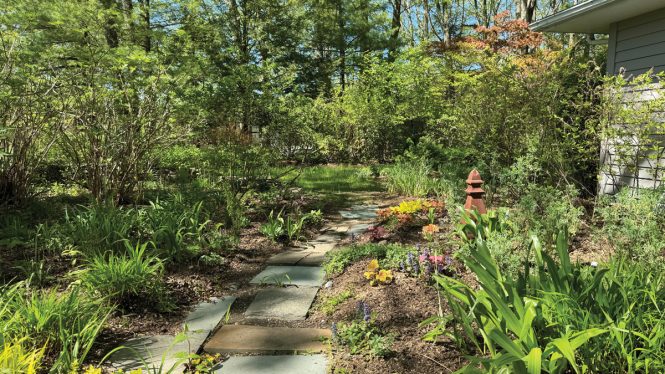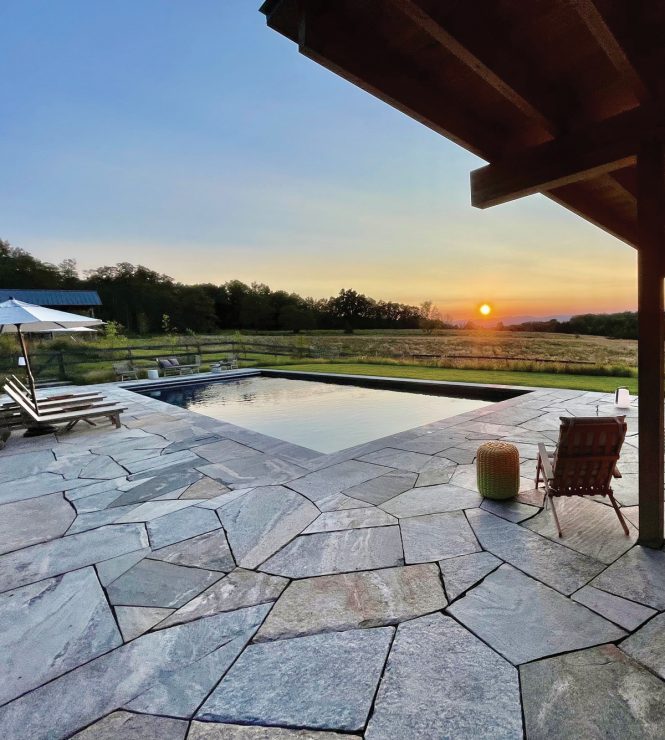Crafting Sustainable Outdoor Spaces for Warm-Weather Living
By Ryan Keegan | Spring 2024 | Home Improvement
The popularity of outdoor living spaces has been on the rise, especially since the beginning of the pandemic. As people got used to spending more time at home, they developed a heightened appreciation for comfortable and functional outdoor areas for relaxation, entertainment, and work. Consequently, manufacturers, retailers, and designers are actively innovating to meet the increased demand for outdoor furnishings, accessories, and decor items. In the Hudson Valley, landscaping and design firms have been crafting extravagant outdoor living spaces, including lush gardens, custom pools, and elaborate kitchens and entertainment areas.
Moving the Kitchen Outdoors
Cabinet Designers in Kingston, led by co-owners Mark Durcan and Jesse Kelly, has focused on the design and installation of interior kitchens and bathrooms for 37 years. Toward the end of last summer, as the company observed a growing demand for outdoor living spaces, they diversified their services to include outdoor kitchens. “It’s becoming a more popular thing as more manufacturers are entering the space,” says Durcan. “We’re really excited about the possibilities here.”
In many ways, the approach to designing outdoor kitchens is fairly similar to designing an indoor kitchen. Basic fundamentals like the golden triangle—comprising the fridge, sink, and range—and how the distance between those elements affects functionality, still apply. Nevertheless, outdoor kitchens do require different considerations. It’s crucial that the products can withstand extreme weather conditions, which is why Cabinet Designers has invested in a new aluminum outdoor kitchen cabinet line called Urban Bonfire. They also worked with Earl B. Feiden Appliance in Kingston, who offers outdoor kitchen appliances.

Cabinet Designers in Kingston recently diversified into outdoor kitchen design and installations, featuring outdoor cabinet brands like by Urban Bonfire, pictured above.
“Typically, outdoor kitchens are about entertaining,” says Durcan. “How much do you like to cook? Do you have kids? Are you having big parties or just family gatherings? And all the infrastructure—electric, lighting, and plumbing—is a factor to consider. It’s not just throwing some cabinets up.”
Think of the Insects
Hudson Valley Native Landscaping—an independently owned division of Poison Ivy Patrol Specialty Landscaping in High Falls—comprises a team of landscape design and plant care specialists who provide clients with healthy, natural habitats in their own backyards. Their services include woodland restoration, tree care, native landscaping, and invasive plant control.
They provide a diverse selection of native plants, with a database of nearly 500 native flowers, shrubs, trees, and groundcovers. These plant offerings cater to a variety of outdoor needs, such as attracting butterflies and hummingbirds with flowers like blue wild indigo, bee balm, and cardinal flowers, or creating shaded areas with ground covers like wild ginger, wild leek, and dwarf crested iris.

A shade garden designed by Hudson Valley Native Landscaping featuring Heucheras and purpose-built to feed early pollinators.
While the firm seeks to design gardens that enhance the aesthetic appeal of clients’s yards, they also ensure that their work contributes positively to the local ecology. They prioritize creating healthy microclimates by carefully selecting native plants that support biodiversity, attract pollinators, and integrate with the surrounding landscape. “We’re running out of insects,” says founder John Messerschmidt. “Birds are dwindling in number, and that’s because insects are dwindling in number. Conventional landscapers choose plants that insects don’t eat, but we get plants that insects do eat because we need insects for the birds to eat.”
Set in Stone
Founded in 2015 by Dustin Vos and based in Gardner, Vos Stoneworks LLC specializes in custom stonework using natural stone. Their stonework projects include boulders, walls, stairs, patios, and pool copings. They also offer landscaping and excavation services, custom fence work, and have a carpentry division to construct decks, gazebos, and pavilions. “We don’t do a lot of the generic stuff,” says Vos. “No cement blocks, no pavers you buy at Lowe’s. We work with real stone.”
The company collaborates with clients to find rare materials to be custom cut, surfaced, and shaped. They source natural stone from various regions, including Maine, Vermont, and China. “Last winter we did a job in New Paltz, and those clients wanted a different look from that of the local stone,” says Vos. “They really wanted a golden tan stone, so I spent months tracking down the materials.” Ultimately, they opted for bush-hammered Sahara Granite sourced from China for the patio stone and South Bay Quartzite Sandstone from Champlain Stone for the wall stone.

A custom patio installation of Liberty Hill granite in Rhinebeck by Vos Stoneworks.
Vos has worked in stonework since 1987; in his youth, he received training from sculptors and artists in Woodstock, and he draws inspiration from the stonework of local landmarks such as the Ashokan Reservoir and Opus 40. “What I bring to the table is an understanding of the local land,” says Vos. “I grew up here, and understanding elevation, waterways, and drainage helps make spaces that last and hold up to the elements.”
The Art of “Land Crafting”
Little Bird Land Crafting, based in Ulster County, creates and maintains low-maintenance gardens and outdoor spaces with a focus on promoting native habitat and biodiversity. “Really, we’ll do any aspect of landscaping as long as it doesn’t involve planting invasives or anything like that,” says founder Emma Voegelin. “I want to give my clients what they want aesthetically, but I also want to preserve the environment.”
Voegelin founded Little Bird in 2004, and she coined the term “land crafting” to describe her style of horticulturally based, detailed work. Their offerings have included creating pollinator gardens to attract beneficial insects and birds, installing low-maintenance clover lawns as eco-friendly alternatives to traditional turf, and establishing vegetable gardens for homegrown produce.
Little Bird Landcrafting manages several long-term contracts, including the maintenance of a 12-acre property for a private collector. Most recently, they worked alongside Vos Stoneworks at Daschner Castle, a 1930s castle within the Minnewaska State Park Preserve, which was acquired by the flower and art studio Floratorium to serve as an Airbnb and event space. Voegelin collaborated with Floratorium founder Carlos Franqui to harmonize Franqui’s faux floral installations with the surrounding natural landscape. “We work very well together, but he would call me the functionality police,” says Voegelin. “He wanted it to look like a castle in the south of France, and we had to keep that vision in mind while also keeping in mind the realities that we’re on the Shawangunk Mountains.”
